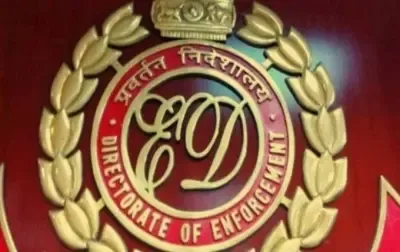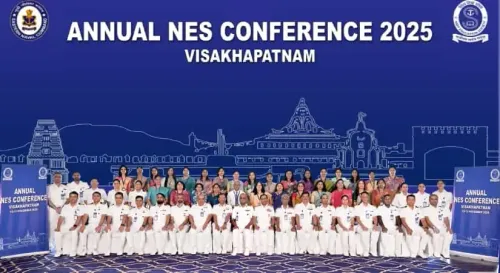Why Did Tejashwi's Raghopur Victory Experience a Decreased Margin?

Synopsis
Key Takeaways
- Tejashwi Yadav retained his seat in Raghopur.
- His winning margin decreased significantly compared to previous elections.
- The RJD faces challenges in maintaining its political relevance.
- The party's performance reflects broader voter sentiment shifts.
- Tejashwi's ambitions may influence future electoral strategies.
New Delhi, Nov 14 (NationPress) For Rashtriya Janata Dal (RJD) leader Tejashwi Yadav, the results of the 2020 Bihar Assembly election were a remarkable success, but this time around, he faced a significant decline in his winning margin, as his party's performance fell short of expectations.
As election trends began to emerge on Friday morning, November 14, some of his supporters remained optimistic, believing that the results would eventually favor the RJD—but it was too late.
Tejashwi managed to retain his seat from the Raghopur Assembly constituency, defeating his closest competitor, Satish Kumar of the Bharatiya Janata Party (BJP), by approximately 14,500 votes, achieving nearly 50 percent of the vote share. He received a total of 1,18,597 votes, while the BJP candidate amassed 1,04,065.
In the 2015 Assembly elections, the margin against the same opponent was 22,733 votes, with Tejashwi securing 49.15 percent of the valid votes in Raghopur. In the 2020 elections, where the same BJP challenger was the runner-up, Tejashwi won with a difference of 38,174 votes and 48.74 percent of the vote share.
Thus, while he has consistently garnered around half of the votes in these three consecutive elections, the 2025 results show a comparatively smaller margin. Despite this, he has fared better than most of his party candidates in the current polls, which reflect a shift in sentiment among the electorate who previously granted his party a significant mandate.
In 2020, contesting 144 of the state's 243 Assembly seats, the RJD emerged as the largest party, winning 75 seats. However, the Opposition Mahagathbandhan fell short of a majority, leading to Tejashwi becoming the Leader of the Opposition in the Bihar Assembly.
In the latest elections, the RJD, again a key player in the Mahagathbandhan, contested 143 seats, currently winning 20 and leading in five constituencies. These elections may be noted in Bihar’s political history as one of the party's worst performances, having previously won only 22 seats in 2010.
At just 36 years old, Tejashwi, a former cricketer, seems eager to make his mark in politics. His ambition was evident when the allies—particularly the Congress—were initially hesitant to publicly endorse him as their Chief Ministerial candidate, but eventually did.
Interestingly, it was not Rahul Gandhi, but Ashok Gehlot, a Congress representative, who ultimately named him as their Chief Ministerial face. Moreover, the Opposition bloc's manifesto was termed ‘Bihar Ka Tejashwi Prann’ or Bihar's Tejashwi Pledge. Notably, Tejashwi undertook solo visits to key districts shortly after the Mahagathbandhan's joint “Voter Adhikar Yatra” concluded on September 1, likely to gauge voter sentiment.
Some analysts viewed this as an attempt to assess whether the joint campaign had primarily benefited the Congress party's fortunes. The son of former Chief Minister parents has swiftly climbed the ranks to become the RJD's de facto leader, especially as his father has faced health issues in recent years. Tejashwi has previously served as Deputy Chief Minister and held significant portfolios in Bihar’s coalition governments, positioning himself as a challenger to Chief Minister Nitish Kumar.
Having a background in both public life and cricket—playing at various age levels before entering politics—Tejashwi's political journey began under his father's guidance, where he was given crucial responsibilities early on as the RJD sought to rejuvenate its leadership and appeal to younger voters.









